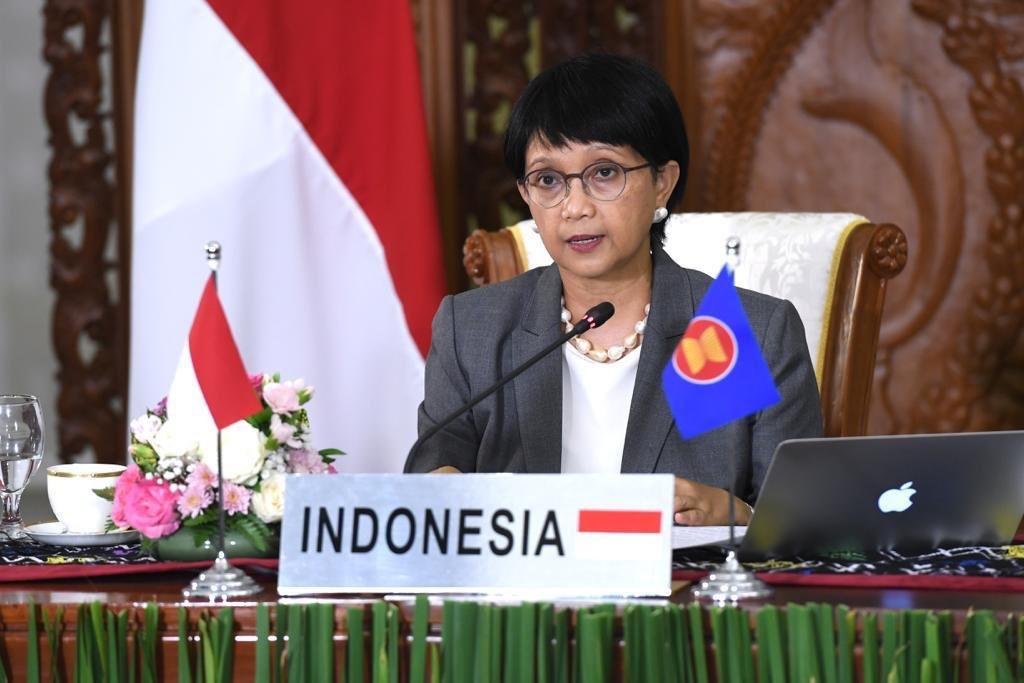Popular Reads
Top Results
Can't find what you're looking for?
View all search resultsPopular Reads
Top Results
Can't find what you're looking for?
View all search resultsAmid China-US rivalry, RI stays neutral
Indonesia’s foreign policy doctrine of being independent and active would be “increasingly relevant”.
Change text size
Gift Premium Articles
to Anyone
A
s the rivalry between the United States and China becomes more intensified in the Indo-Pacific region, Indonesia once again maintained its neutrality, with Foreign Minister Retno LP Marsudi pledging to work within the framework of ASEAN as the primary conduit for the country's diplomacy.
Retno said that as countries in the region could expect that rivalries between the US and China would only increase in tension, she maintained that Indonesia’s foreign policy doctrine of being independent and active would be “increasingly relevant” and that ASEAN unity would be key to respond to the challenge.
"ASEAN should remain an anchor for stability, peace and prosperity in the Indo-Pacific region," Retno said in her virtual speech.
The minister did not specifically mention the two major superpowers but said that "deepening rivalry between great powers" not only "presented yet another challenge for ASEAN", but also added to the world's problems of coronavirus, conflicts and tensions, refugee crisis and climate change.
Over the past few years, geopolitical tension between the US and China has increased in the Indo-Pacific region, which spans the Indian Ocean and the Pacific Ocean, with Indonesia and Southeast Asia being at the center.
In September, the US announced a new security partnership with Australia and the United Kingdom, dubbed AUKUS, which China protested, calling it a “threat to regional stability”. The US also doubled down on its engagement with Japan, Australia and India through the Quad by holding an in-person summit in Washington.
Shortly before Retno's speech on Thursday, Japanese Prime Minister Fumio Kishida and his Australian counterpart Scott Morrison on Thursday signed a treaty to facilitate joint exercises as they vowed in a virtual meeting to strengthen security cooperation.
Kishida himself had been considering a visit to Australia in January to sign the agreement but abandoned the plan to focus on the COVID-19 response in Japan.
The administration of President Joe Biden, meanwhile, has stepped up its pressure on China by launching its diplomatic boycott of the Beijing Winter Olympics, regularly protesting over alleged human rights abuses against the Uighur minority as well as frequently reiterating its pledge to stand with Taiwan in the event of an attack by China.
Meanwhile, China has been working to protect its sweeping “Nine-Dash Line” claim in the South China Sea and maintains its military presence in the world’s busiest sea lanes where a handful of Southeast Asian nations also have overlapping claims. China’s Nine-Dash Line was invalidated by an international tribunal in 2016.
Although Indonesia is not a claimant, China insisted it had “disputes” with Indonesia over what it called “relevant waters” near Indonesia’s North Natuna Sea, where an oil and gas drilling project was completed last year despite the looming presence of Chinese vessels.
In her address, Retno reiterated that the conduct of the maritime boundaries delimitation negotiations should be based on the 1982 United Nations Convention on the Law of the Sea (UNCLOS).
“I would like to emphasize one particular principle relating to the sovereignty and sovereign rights in Indonesian waters, that any claim by any party must be made in compliance with international law including UNCLOS 1982. Indonesia will continue to reject any claims that lack international legal basis,” she said.
As for ASEAN, Retno pledged that Indonesia would continue to strengthen the association’s “centrality and solidity” in 2022. "ASEAN must stay relevant and could respond to new challenges in the region and in the world," she said.
However, the political crisis in Myanmar, almost a year now since a military coup ousted a democratically elected government, has raised questions over the 10-member group’s unity.
Cambodia’s Hun Sen, ASEAN’s chair for this year, will be visiting Naypyidaw on Friday at the invitation of Myanmar’s de-facto leader Gen. Min Aung Hlaing, raising concerns that he would undo the ASEAN-9 consensus to only invite “non-political” representation from Myanmar.
On Wednesday, President Joko “Jokowi” Widodo spoke with the Cambodian long-time leader over the telephone, where he reiterated Indonesia’s position on Myanmar issues.
“If there's no significant progress on the implementation of [the five point consensus], Myanmar should only be represented by non-political level at [the next] ASEAN meetings,” Jokowi said on Twitter.
On Wednesday, Hun Sen warned that Myanmar has "all the ingredients for civil war."
"The political and security crisis in Myanmar is deepening, and has led to [an] economic, health and humanitarian crisis," he said.
"We feel that all the ingredients for civil war are now on the table."
In her speech, Retno also maintained that unless Myanmar implemented the five point consensus it would be difficult to allow the country to have its seat at future ASEAN meetings.
"ASEAN must hold that commitment firm and that the safety and well-being of Myanmar's people will be the main focus of Indonesia," she said.










